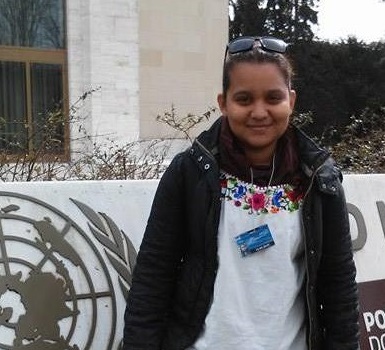
Human rights defender's story: Alejandra Burgos from El Salvador
Alejandra Burgos is Coordinator of the Salvadoran Network of Women Human Rights Defenders, which aims to articulate efforts for the protection of women defenders and the promotion of women’s rights. She is based in San Salvador, El Salvador.
Alejandra was in Geneva to carry out advocacy ahead of El Salvador’s UPR and to participate in a high profile side event on the protection of women defenders alongside the 28th session of the UN Human Rights Council. She took some time out to speak to ISHR about her work and the obstacles facing human rights defenders in her country, particularly those working in the area of sexual and reproductive health and rights.
‘One of our main demands is that the government recognise the legitimacy of our struggle.’
Alejandra highlighted that much human rights defence in El Salvador is criminalised, so what is needed is to move to the other extreme in which laws and policies recognise and protect human rights defenders.
According to Alejandra, another issue is the lack of information available to defenders.
‘Human rights defenders in El Salvador also need more information regarding the mechanisms which exist to protect their human rights, and at the same time those mechanisms must be strengthened. For example, we have a national human rights institution, but it has very few resources and a limited mandate: it must be strengthened.’
The women defenders network has identified that the risks facing women defenders are exacerbated when those women also work on issues which imply particularly high levels of risk. For example, WHRDs working on issues of land and territory face ever more grave threats.
Alejandra also told ISHR that the rise in organised crime related to drug trafficking has implied changes to the reality of everybody in El Salvador, including human rights defenders.
‘It affects everything. People don’t even feel safe at home, for example, and are starting to employ more armed guards. The struggle for land has intensified too, with communities coming head to head with drug gangs who want to control territory. Human rights defenders in some regions have to negotiate with gangs simply to be able to do their work and to ensure it doesn’t become another hostile actor which threatens your life. More and more people are displaced or migrate due to insecurity.’
The impact of this context upon human rights defenders becomes even more complicated when the authorities automatically blame crimes on gangs before an investigation is carried out.
‘It becomes very difficult to show that an attack on an activist was a consequence of their human rights defence and not simply a criminal attack. This becomes even more complicated when you bear in mind the fact that those who want to attack human rights defenders often employ gang members to carry out attacks disguised as casual crimes. What’s more, before an investigation has taken place, the authorities often come out to say ‘we believe this victim was linked to organised crime’.’
Alejandra identifies the regional Office of the UN High Commissioner for Human Rights, in Panama, as an important ally, whilst representatives of the Organisation of American States have also visited and shown support for the work of defenders.
‘When these international mechanisms visit or speak out, they help us to open doors which are usually closed to us and suddenly we can sit down with different people in the government and have a different kind of conversation.‘
Alejandra notes that there have been some positive changes in El Salvador, such as an increase in the number of women in public spaces and positions of power, whilst there are also increasingly more girls going to school and a strengthening of legislation for women’s rights.
‘These advances are the fruit of the struggles and activism of many women. But now the State needs to take the next steps to consolidate these changes and push on to the next level. Many of the institutions which have been created don’t work or aren’t properly funded and supported.’
In Geneva, Alejandra was speaking to key contacts about the demands she has of her own government, as well as international actors.
‘We want a protocol for attention and protection for women human rights defenders. This in itself would provide us with recognition and increase our legitimacy. El Salvador is a member of the Human Rights Council now and we hope we can have more impact in demanding the respect of human rights within the country. We want the government’s work at home to be coherent with its international statement of intent. Meanwhile internationally, the UN and the Inter American Commission for Human Rights could carry out a scientific and objective study of the laws in the continent which criminalise the work of WHRDs.’
Alejandra Burgos can be contacted at [email protected]. Follow her on Twitter: @liaburgos1310
